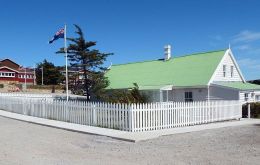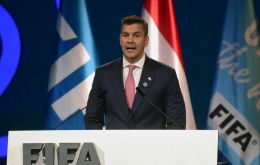MercoPress. South Atlantic News Agency
Economy
-
Wednesday, May 21st 2025 - 10:28 UTC
Milei highlights Argentina's prosperous future

During his speech at the AmCham Summit 2025 in Buenos Aires, organized by the U.S. Chamber of Commerce, President Javier Milei celebrated his party's recent electoral victory in the Autonomous City and promised that inflation would be eliminated by mid-2026.
-
Wednesday, May 21st 2025 - 08:05 UTC
Brazil’s command of soy markets tested by record crops and Argentina

Despite a record grains and oil seeds harvest, Brazil’s soybean trading has slowed significantly, because of the mismatch between buyers’ prices and suppliers’ expectations, points out Globo Rural, an agribusiness site.
-
Wednesday, May 21st 2025 - 07:48 UTC
UK to boost R&D in several areas with long term (over 10-year) funding to attract private investment

British Science Minister Lord Vallance unveiled on Monday a more robust R&D criteria policy exploring innovation in areas as diverse as human health and cutting-edge computing, but particularly with a much-needed long-term certainty.
-
Tuesday, May 20th 2025 - 10:07 UTC
Uruguay reaches agreement with railroad building consortium

The Uruguayan Government of President Yamandú Orsi Monday reached an agreement with the Grupo Vía Central consortium to resolve a dispute over unpaid debts regarding the Central Railway project, thus avoiding international arbitration, it was announced in Montevideo.
-
Monday, May 19th 2025 - 19:05 UTC
Bird flu: Brazil could resume chicken exports in 28 days, says Minister Fávaro

Brazil could resume chicken meat exports in 28 days if no new cases of avian influenza are reported, Agriculture Minister Carlos Fávaro told reporters Monday. He also pointed out that strict containment measures were in place following last week's outbreak.
-
Monday, May 19th 2025 - 10:40 UTC
Significant drop in Paraguayan unemployment reported

Paraguay has recorded significant improvements in its labor market, with formal employment rising and unemployment hitting its lowest level for a first quarter since 2017. The employed population grew to 2.91 million people in the first quarter of 2025, marking an increase from 2.87 million in the same period of 2024. The unemployment rate fell to 5.6%, down from 6.9% in early 2024, with 41,106 individuals moving out of joblessness.
-
Monday, May 19th 2025 - 08:26 UTC
Moody’s lowers US credit rating; US budget deficit plus 6% of GDP

Moody’s Ratings decision last week to lower the US credit rating to Aa1 from Aaa, (the highest investment-grade position) triggered strong reactions and criticisms from President Donald Trump and his political advisor.
-
Friday, May 16th 2025 - 22:11 UTC
Universidad Austral study finds Argentina's population to be ageing

A study by the Universidad Austral’s Human Development Observatory, based on data from Argentina's National Institute of Statistics and Census (Indec), showed significant demographic shifts in the South American country, with the number of births dropping by 40% since 2014.
-
Friday, May 16th 2025 - 21:22 UTC
Falklands Government Budget announcement delayed until July

The Falkland Islands Government has postponed the announcement of its 2025/26 budget, which was initially scheduled for June 3. According to a statement from the Legislative Assembly, the delay comes after members of the Budget Select Committee expressed dissatisfaction with the final draft presented, leading to a decision to take additional time for consensus-building.
-
Friday, May 16th 2025 - 09:17 UTC
Peña highlights Paraguay's booming present at FIFA Congress

Paraguayan President Santiago Peña highlighted his country's economic, social, and cultural growth, which -he claimed- was the fastest in the region over the past 35 years. He made those remarks Thursday during the 75th FIFA Congress held in Asunción.
